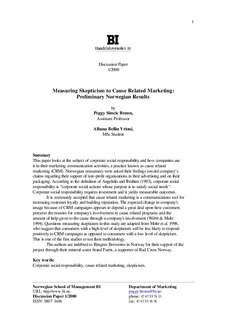Measuring Skepticism to Cause Related Marketing
Working paper
Permanent lenke
http://hdl.handle.net/11250/94023Utgivelsesdato
2000Metadata
Vis full innførselSamlinger
- Discussion Papers [30]
Sammendrag
This paper looks at the subject of corporate social responsibility and how companies use it in their marketing communication activities, a practice known as cause related marketing (CRM). Norwegian consumers were asked their feelings toward company’s claims regarding their support of non-profit organizations in their advertising and on their packaging. According to the definition of Angelidis and Ibrahim (1993), corporate social responsibility is “corporate social actions whose purpose is to satisfy social needs”. Corporate social responsibility requires investment and it yields measurable outcomes.
It is commonly accepted that cause related marketing is a communications tool for increasing customer loyalty and building reputation. The expected change in company's image because of CRM campaigns appears to depend a great deal upon how customers perceive the reasons for company's involvement in cause related programs and the amount of help given to the cause through a company's involvement (Webb & Mohr 1998). Questions measuring skepticism in this study are adapted from Mohr et al. 1998, who suggest that consumers with a high level of skepticism will be less likely to respond positively to CRM campaigns as opposed to consumers with a low level of skepticism. This is one of the first studies to test their methodology.
The authors are indebted to Ringnes Breweries in Norway for their support of the project through their mineral water brand Farris, a supporter of Red Cross Norway.
Serie
Discussion Paper01/2000
